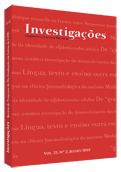Conflitos e Tensões na Construção da Identidade de Alfabetizandos Adultos
Abstract
Esse estudo mostra como o discurso de alfabetizandos adultos é revelador da imagem que eles têm de si. Noções como imagem pública e face subsidiam a análise de atos de linguagem2 presentes na fala dos sujeitos pesquisados. Os dados foram coletados em entrevistas áudio-gravadas a sete alfabetizandos do Projeto Brasil Alfabetizado. As respostas sugerem o desejo de autonomia dos entrevistados em relação às práticas cotidianas da escrita e demonstram que, no processo da alfabetização, as mudanças na esfera das suas identidades ocorrem em meio a conflitos e tensões gerados pelas expectativas pessoais e sociais dos aprendizesReferences
AUSTIN, J.L. 1962. How to Do Things with Words. Cambridge, Mass.: Havard University Press.
BROWN, P. & LEVINSON, S. 1987. Politeness: Some Universals in Language Usage. Cambridge: University Press.
GOFFMAN, E. 1967. Interaction Ritual: essays on face to face behavior. New York, Basic Books.
GOFFMAN, E. 1971. Relations in Public: microstudies of public order. New York, Basic Books.
GRICE, H. P. 1982. Lógica e Conversação. In: M. DASCAL. (org). Fundamentos Metodológicos da Linguagem: vol. 4 - Pragmática - Problemas, Críticas, Perspectivas da Lingüística. São Paulo: Global, pp. 81-103.
GUMPERZ, J.J. 1982. Discourse Strategies. Cambridge University Press, London.
KERBRATH-ORECCHIONI, C. 1994. Les Interactions Verbales. Tome III. Armand Colin, Paris.
KLEIMAN, A. 2002a. A construção de identidades em sala de aula: um enfoque interacional. In: SIGNOINI, I.(org.). Linguagem e Identidade. São Paulo: Mercado de Letras, pp. 267-302.
______ .2002b. Ação e Mudança na Sala de Aula: uma pesquisa sobre letramento e interação. In: ROJO, R. (org.). Alfabetização e Letramento. São Paulo: Mercado de Letras, pp. 173-203.
______ .2003. Modelos de letramento e as práticas de alfabetização na escola. In: KLEIMEN, A. (0rg.) Os Significados do Letramento. São Paulo: Mercado de Letras, pp. 15-61.
MAGALHÃES. I. 2003. Práticas Discursivas de Letramento: a construção da identidade em relato de mulheres. In: KLEIMAN, A (org.). Os Significados do Letramento. São Paulo: Mercado de Letras, pp. 201-235.
MARCUSCHI, L.A. 2003. Análise da Conversação. São Paulo: Ática, 2003.
MATOS, F. G de.1998. Pedagogia da Positividade: comunicação construtiva em Português. Recife: Ed. Universitária.
RATTO, I. 2003. Ação política: fator de constituição do letramento do analfabeto adulto. In: KLEIMAN, A (org.). Os Significados do Letramento. São Paulo: Mercado de Letras, pp. 267-290.
ROJO, R. 2002. O letramento na ontogênese: uma perspectiva sociconstrutivista. In: ROJO, R. (org.) Alfabetização e Letramento. São Paulo: Mercado de Letras.
SEARLE, J. 1980. Speech Acts - An Essay in the Philosophy of Language. Cambridge: Cambridge Univesity Press.
STREET, B [s.d.]. Literacy in Theory and Practice. Cambridge, Cambridge University Press.
VANDERVEKEN, D. 1992. La Théorie des Actes de Discourse et l’Analyse de la Conversacion. Cahiers de Linguistque Française. Nº 13. Geneve, pp. 9-61.
Downloads
Published
How to Cite
Issue
Section
License
Copyright (c) 2010 Maria Lúcia Ferreira de Figueirêdo Barbosa

This work is licensed under a Creative Commons Attribution 4.0 International License.
Authors who publish with Revista Investigações agree to the following terms:
Authors retain copyright and grant the journal right of first publication with the work simultaneously licensed under the Creative Commons Attribution 4.0 International (CC BY 4.0) license that allows others to share the work with an acknowledgement of the work's authorship and initial publication in this journal.
Authors are able to enter into separate, additional contractual arrangements for the non-exclusive distribution of the journal's published version of the work (e.g., post it to an institutional repository or publish it in a book), with an acknowledgement of its initial publication in this journal.
You are free to:
Share — copy and redistribute the material in any medium or format for any purpose, even commercially.
Adapt — remix, transform, and build upon the material for any purpose, even commercially.
The licensor cannot revoke these freedoms as long as you follow the license terms.
Under the following terms:
Attribution — You must give appropriate credit , provide a link to the license, and indicate if changes were made . You may do so in any reasonable manner, but not in any way that suggests the licensor endorses you or your use.
No additional restrictions — You may not apply legal terms or technological measures that legally restrict others from doing anything the license permits.

